Although typically I write about audio stuff on these blog pages, not infrequently I'll talk about my computer updates as well. Looking back, this has allowed me to review the journey along the way over the last decade. As we enter into the Christmas season this year, I think this is a good time to be looking at computer parts as prices of things like SSD drives and DRAM in particular seem to be very attractive with DDR4 and DDR5 memory trending down, M.2 SSD likewise appearing to be bottoming over the last 18 months perhaps as the cost of basic necessities (food, housing, gas) have risen and disposable income reduced. I would not be surprised if inflation starts to drop in 2024 while the electronics parts rise in price again.
Who knows exactly what the future brings, but this looks like one of the best time to grab something like a 2TB M.2 SSD or some RAM:
The trend isn't as obvious with CPU prices. However, I upgraded my Workstation computer recently to the AMD Ryzen 9 5950X CPU - 16-cores, 32-threads I found at a decent price. And since it has been ages, I also updated my Gaming PC in the living room for the heck of it to the Ryzen 7 5700X.
My justification for the Workstation CPU upgrade was that I was in need of an update to my work computer which for the last few years has been the old first-gen Ryzen 1700. As has been my usual fashion for years, I'll move my Ryzen 9 3900X (previously discussed) over to the office and update the Workstation I use at home which sees more CPU usage.
As for the Gaming computer... Well, the Intel i7-3770K I was using is just ancient (launched mid-2012, using DDR3 RAM) by computer standards, so why not? In 2023, might as well at least update the CPU to go beyond current high-end game console standards of the PS5 and XBOX X which are about the speed of a slower Ryzen 7 3700X by most estimates. The AMD Ryzen 7 5700X is currently less than US$190, 8-core, 16-threads, 7nm process, released in early 2022, TDP only 65W.
For the Workstation, I was tempted to go with the latest and greatest Ryzen 9 7950X or the Intel i9-14900K but could not justify the need for a new motherboard and DDR5 RAM. Already for audio and video editing work, as well as some software testing, I actually can't complain about the current 12-core Ryzen 9 3900X.
One nice thing about the AMD Ryzen series is that overall power utilization remains very reasonable. Despite the increased core count, the TDP has stayed at 105W from the 3900X to 5950X. Using Core Temp I've seen power estimates hover typically around 25W when idle all the way to bursts of 145W with all cores running and turbo clock speeds. Even though AMD recommends liquid cooling for this CPU, I don't see this as needed at all. In fact, air cooling with a modern inexpensive cooler/fan works great like this DeepCool GAMMAXX AG400 which can be had for less than US$25 and does an excellent job (I got the nicer looking black AG400 BK for a few more bucks but that's cosmetic):
With a little bit of Arctic MX-4 thermal compound which has been my "go to" for the last while, I'm seeing idle 5950X temperatures floating around 35°C with maximum 75°C when pushed during stress testing like running LinpackXtreme for an hour. This is a good distance away from the throttling temperature (TjMAX) 90°C. The cooler is quiet, certainly noticeably quieter than the previous AMD Wraith that came with the stock Ryzen 9 3900X, and I can use the BIOS fan control to reduce the fan-speed ramp without large temperature rises.
Since RAM prices are good, I bought another 64GB (2x32GB) DDR4-3600 - doubling down on the previous 64GB I bought in September with the TEAMGROUP T-Create 64GB CL18; this RAM has even better timing parameters than the Patriot Viper Elite II so it'll have no problems running at the Patriot's CL20 DDR4-3600 XMP setting.
As it turned out, I had no issues with getting the Patriot Viper Elite II to run at the TEAMGROUP's CL18 XMP settings. Just make sure to test the RAM with something like TestMem5 right after a reboot so it can claim as much memory as possible to test:
Here's a look at the LinpackXtreme benchmark result with all cores used of the Ryzen 9 5950X with 128GB of DDR4-3600 RAM:
Good to see no degradation in the number of GFLOPS indicating that there's no CPU throttling; I've run this for up to 25 trials and it looks good with no issues. Averaging around 460GFLOPS makes this CPU/computer 7+ times the speed of the miniPC's I've reviewed over the last while such as the recent Intel N100-based Beelink EQ12 for audio streaming and home theater playback.
As for the Ryzen 7 5700X, for gaming this is an economical option with peak boost of 4.6GHz, and the 65W TDP allows it to run cooler in a compact case. I'm still just pairing this with the older nVidia GTX 1080 GPU for now. Even an inexpensive CPU like this is not going to be the main bottlenecking factor for framerates when playing games at 4K for the foreseeable future. Clearly look to the GPU even as game engines become better at using multi-core/multi-threaded CPUs.
If you want to seriously get into gaming and looking for a fantastic CPU, go grab the AMD Ryzen 5800X3D (AM4, DDR4) or 7800X3D (AM5, DDR5) with even larger 96MB L3 cache. No need to upgrade CPUs for a loooong time with those I think.
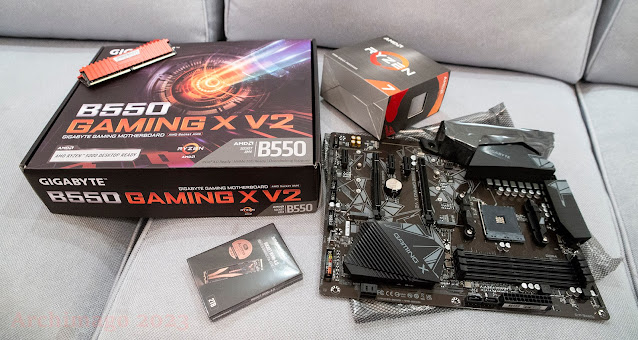 |
| Gaming build with Gigabyte B550 Gaming X V2, Ryzen 7 5700X, 32GB DDR4-3200, Sabrent Rocket M.2 SSD 2TB. |
Gigabyte B550 Gaming X V2 motherboard (less than US$130), and the Sabrent Rocket M.2 SSD 2TB PCIe Gen 4 (less than US$120) were purchased for the new Gaming PC build. 2TB M.2 PCIe Gen 4 storage will be fast, and a good amount as the main install point for Windows 11 and games these days. If you have lots of games to install, consider the 4TB version which pushes the price to US$300.
 |
| I'll just use the stock cooler from my old Ryzen 7 1700 top right. ASUS RTX 1080 graphics card. Of course a little Benriach The Sixteen Speyside Single Malt always helps during computer building. 😋 |
Here's Linpack Xtreme benchmark results on the 5700X with the Gigabyte motherboard and Corsair LPX 32GB DDR4-3200 RAM:
285-290GFLOPS should be good enough for gaming I would think!
Like upgrading other consumer goods in life, we should cater to the target purpose. IMO, it's definitely not cool wasting money and there's no pragmatic reason to spend a ton of money on a simple music "endpoint" computer or wasting energy running such as systems. But if you really want to do that, by all means build a monster audiophile PC for the psychological and social non-utilitarian benefits. ;-)
As discussed in the past, there's nothing wrong with a simple Raspberry Pi build for best audio quality, it's not going to sound different anyways with a good USB DAC.
After all the assembly and OS installation, I like making sure my computers are working as expected. Linpack Xtreme is a good start, let's run more benchmarks to make sure. I like using AIDA64 Extreme with comparison to some of the other CPUs/RAM combinations I've tested over the years; the new ones in bold (3600 and 3200 of course reflects the DDR4 speed):
Memory Tests: Read (MB/s) Write (MB/s) Copy (MB/s) Latency (ns)
AMD Ryzen 9 5950X 3600 51541 51087 50008 72.0
AMD Ryzen 9 3900X 3200 46717 46733 44895 84.4
AMD Ryzen 7 5700X 3200 46400 25551 44632 66.4
Beelink EQ12 N100 31480 29051 27778 44.9
Beelink Mini S 15910 17470 15860 60.8
MeLE Quieter3Q N5105 16959 22453 19042 66.9
MeLE Quieter2Q J4125 10409 10631 12860 93.5
Beelink Ryzen 7 4700U 36173 35510 29360 99.8
Intel NUC 6i5SYH 32161 45606 36301 66.1
Intel i7-3770K 4GHz DDR3 23837 24756 23103 62.3
Intel i7-7700K Server 31323 33913 31512 61.9
CPU Speed (Int): CPU Queen PhotoWorxx(MPx/s) ZLib(MB/s) AES(MB/s) SHA3(MB/s)
Ryzen 9 5950X 155680 27891 1583.7 123669 496!!!
Ryzen 9 3900X 122606 27231 1216.0 107036 3675
Ryzen 7 5700X 106704 21954 866.2 134871 3347
Beelink EQ12 N100 22647 16139 219.2 21796 801
Beelink Mini S 22293 7383 188.0 19420 515
MeLE Q3Q N5105 20157 8640 144.5 15822 431
MeLE Q2Q J4125 19156 6771 120.4 9301 365
Beelink 4700U 49409 20336 422.8 48864 1534
NUC 6i5SYH 18092 15463 119.3 6101 553
i7-3700K 4GHz 50392 13930 343.3 15622 860
i7-7700K Server 54240 20647 392.4 20509 1874
CPU Speed (FP): Julia Mandel SinJulia Ray-Trace(kRay/s) FP64 Ray-Trace
Ryzen 9 5950X 175362 96358 25649 27965 14466
Ryzen 9 3900X 114401 60386 20596 21659 11934
Ryzen 7 5700X 97630 53873 13371 15643 8177
Beelink EQ12 N100 11439 5778 1124 2188 1176
Beelink Mini S 7462 3967 1003 1244 677
MeLE Q3Q N5105 5604 2974 1003 1034 533
MeLE Q2Q J4125 5835 3179 1112 933 499
Beelink 4700U 50212 27457 8003 8750 4870
NUC 6i5SYH 11358 6126 1603 2417 1352
i7-3700K 4GHz 21099 11182 5383 3789 2042
i7-7700K Server 38236 20577 5422 8160 4505
Memory performance is as expected with ~10% gain for DDR4-3600 vs. 3200. Notice the slower half-speed write speed for the 5700X. These Ryzen 7's are a single "chiplet" design compared to dual with the Ryzen 9 which has implications for memory access - write bandwidth is half of read per cycle.
Processing speed is something like 20+% gains over the Ryzen 9 3900X with the faster 5950X CPU using the same MSI X570-A Pro (MS-7C37) motherboard but also with faster 128GB DDR4-3600 RAM. There are some oddities like the small increase in PhotoWorxx and more bizarrely the SHA3 result is massively down (I double checked with a few runs and also with virtualization on/off). Maybe there's a bug in the software; I used the latest AIDA64 6.92.6600 version.
Notice the Intel i7-7700K performs quite well on PhotoWorxx; different CPU architectures will have strengths and weaknesses but in mixed computing, things should even out for the processor tier.
As a complete computer system including the nVidia RTX 4090 GPU, here are the UserBenchmark results of the updated Ryzen 9 5950X Workstation:
It's intended to be a workstation so I'm happy that indeed we're scoring nicely up at 475% in that category. The Desktop score is heavily weighted towards single and dual-core performance which really leaves out much of the number-crunching ability of this 16-core CPU. Intel CPUs in general have better single-core performance due to their ring-based design where the cores closer to the cache work faster. This is particularly helpful for tests like the Desktop score in UserBenchmark. In comparison, AMD's modular "chiplets" design are connected by their "Infinity Fabric" interconnect, the speed of which can be adjusted with the FCLK BIOS setting for a bit of overclocking if desired.
Interesting that the nVidia RTX 4090 is reported to be "performing below expectations" despite being at 75%ile of devices tested! I suspect it's looking at the core and memory speeds which have been increased, but because I'm "Power Limit Overclocking" the device, compared to others at that clock speed, it's slower than a full overclock.
The System Memory Ladder Latency shows the effect of the 64KB/core L1, 512KB/core L2, and 64MB total L3 caches and DIMM memory access based on various block sizes. The larger the block size we can maintain with lower latency, the better. Something like this with <70ns at 128MB looks good these days with very low latency until above 16MB block size.
As for the Game Computer with Ryzen 7 5700X CPU, nVidia GTX 1080 GPU, and 32GB DDR4-3200 RAM:
Not bad at all achieving more than 110% on the UserBenchmark test for all categories. Of course, it's important to be cautious about synthetic benchmarks and one's real-world experience is what really matters. Historically, UserBenchmark scores have been criticized for being biased towards lower-core systems and against AMD as well. For the record, prior to upgrading to the Ryzen 7 5700X, with the told Intel i7-3770K + DDR3 RAM + RTX 1080, UserBenchmark reported Gaming 70%, Desktop 79%, and Workstation 58%.
Great speed on the 2TB Sabrent Rocket NVMe M.2 drive especially given how inexpensive storage is these days! Audiophiles, be mindful of current storage prices if you buy an audio computer/server and they're asking too much for storage upgrades.
The main gaming impediment is the old nVidia GTX 1080 GPU. As a "casual" gamer, this is still more than enough in late 2023, IMO. With newer game engines that can benefit from higher cores and threads (like Forza Horizon 5 or the new 2023 Forza Motorsport), there is a noticeable improvement in stability of framerates even though maximum fps is still mostly a function of the GPU at 4K. I guess one of these days, the RTX 4090 can become part of the gaming rig when/if I need an even more powerful workstation GPU!
--------------------
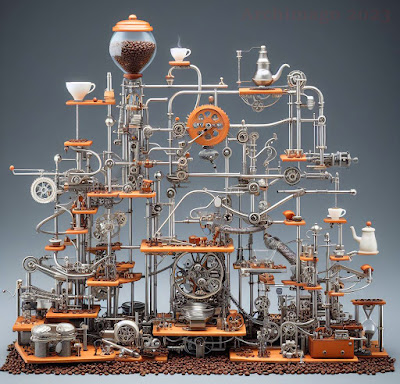 |
| The ultimate coffee machine. ;-) |
Like my audio system, I try not to update tech hardware too much unless I really have a need and there's decent value like when prices are good.
Beyond synthetic benchmarks, the difference between the Ryzen 9 5950X and higher models (like say the AMD 7000 series) for the vast majority of heavy computation tasks will likely be only seconds or minutes if it's something that can take an hour or more in the real world. Memory, LAN, Internet, storage speeds will all play a role for most complex tasks these days. For lengthy tasks, I'll usually run the computer overnight anyways so I'm unlikely to notice a difference. The most CPU-intensive thing I might do that could last hours would be video rendering and video transcoding such as converting UHD BluRay rips over to 4K HEVC using HandBrake in high quality. (I'm sticking with HEVC/H.265 for now since the next generation AV1 codec still doesn't have good device support yet even though it can be more storage-efficient.)
For specialized duties like running AI/LLM fine-tuning and inferencing, there's really no getting around having a fast GPU like the nVidia RTX 4090 graphics card discussed recently for heavy parallel-processing. For those playing around with this, the new Mistral-7b model released in the last month is quite amazing given the small 7-billion parameter size! The pace of development has been impressive.
I've seen folks overclock the Ryzen 9 5950X to Linpack Xtreme results over 600GFLOPS - I don't think I need to do that at this time. Unlike audiophile gear which IMO is about achieving fidelity to satisfy the limits of human hearing with imposed constraints (like only 2 channels or the limits of the medium like vinyl), until the day when computers are instantaneously fast for all applications, we can always ask for more speed! The relative points of "diminishing returns" between audiophilia and computing technology obviously very different. 😉
While hardware computing speeds continue to increase, and Moore's Law probably continues to keep pace with doubling of complexity and speed every 2 years in the high-performance and research world, for us consumers, the need for what used to be every couple-years computer upgrades has clearly slowed. Much of what I do these days including writing this blog or charting on electronic medical records are cloud-based, dedicating the computation elsewhere; what's more important is Internet bandwidth than one's computer's speed. I'm guessing we're seeing this trend of slower need for growth of processing speed across the board with consumer electronics like smart phones, laptops, tablets, digital cameras, large-screen TVs, etc. Seriously, how many consumers absolutely need a brand new iPhone 15 if one already has the iPhone 12 or 13?
Unless some "killer apps" get me to upgrade the CPU - hyper-realistic graphics and "cognitive-capable" apps like power-hungry AI to complement fast GPUs are all I can imagine driving this in the consumer space - I hope no more fiddling with CPUs and motherboards for the next 5 years at least.
Let's see how this plays out! 😄
--------------------
Although bit by bit my computers at home are almost all capable of running Windows 11, I still have a couple of machines that cannot be updated to the latest OS. Neither the Intel i7-7700K currently being used as my Windows Server 2019 machine nor the general machine based on the Intel i5-6500 in the kids' study are supported; and I doubt either need to be updated when Windows 10 is scheduled for end-of-life on October 14, 2025 or Windows Server 2019 support ends on January 9, 2024 which is just 2 months from now (although there's still "security support" for the next 5 years)!
It's interesting when we look at the pattern of Windows version prevalence over time:
 |
| Prevalence of Windows installations from 2019 to October 2023. Follow along at StatCounter. |
As discussed above, I think within the consumer world, we actually do not need to upgrade hardware as fast any more. At one time, a 5 year old CPU would have been noticeably slow, but these days, a CPU like the Intel i7-8700K or say the AMD Ryzen 2700X from April 2018 would still be highly useful for most general tasks whether it be Office-like duties, web surfing, social media, or general gaming.
For technically savvy consumers, I think the end-of-life for Windows 10 is possibly no big deal because there are ways to install Windows 11 by going around their CPU and TPM compatibility checks if doing so is needed. For example, we can bypass using Rufus to create our own install, or run some registry hacks (also see this easier technique). While one might be able to run Windows 11 unofficially, realize that it will not receive security updates automatically so that would be a hassle.
In a business or enterprise environment though, the end of Windows 10 upgrades, bug fixes, and security changes are a big deal. There are concerns that forcing end-users to upgrade to Windows 11 using compatible hardware could result in premature electronic hardware waste. These days, in the interest of minimizing environmental impacts, perhaps petitions like this from Public Interest Research Group (PIRG) demanding continued support from Microsoft beyond 2025 could be an important step for consumers to get on board with, as well as promoting "right to repair" legislation to cover our electronics gear. I encourage you to sign the petition if this makes sense to you.
With that, I wish everyone plenty of computing power under the hood for whatever you're needing to do! It's Remembrance Day long weekend here in Canada. After the memorial observations for those who sacrificed in the Wars, it's our typical leadup to Christmas with holiday songs on the radio again... I do love this time of the year so long as I can filter out the excessive consumerism.
Do keep an eye on "Black Friday"/holiday deals for computer parts though if you're in need of an update/upgrade cycle. 😁
While I'm sure there will be remasters, special editions, deluxe packages to come, for me, I'm happy with the "final" music drop from The Beatles - the remixed and remastered Red Album (1962-1966) and Blue Album (1967-1970) out this past week. Both only of interest because they're available in multichannel/Atmos streams for those wanting to hear the compilation material (first released on LP ages ago in 1973).
Some of the early material released originally in mono like "I Saw Her Standing There" off Please Please Me (early 1963) or "All My Loving" and "Roll Over Beethoven" from With The Beatles (late 1963) sound better than the stereo mixes that have come out subsequently over the years. Much more natural and less primitive hard-panned sounding. "Eight Days A Week" from Beatles for Sale (1964), while never a good-sounding recording, at least is cleaner, less gritty, and vocals centered better compared to the 2009 stereo remaster. Too bad they didn't use the center channel enough, IMO.
As discussed last time, see if you can listen to a multichannel-to-stereo downmix if you want to go beyond lame DR8-9 stereo tracks on CD and 24/96 HDtracks download!
Addendum: November 13, 2023
I thought I'd add the AIDA64 data in the chart above for the oldest CPU I have currently still running here at home - the Intel i7-3770K which for ages has been the heart of my game machine. It's now more than 11 years old but still fine for desktop duties. Running 32GB DDR3-1600, slight overclock to 4GHz max, it's able to perform at about 113GFLOPS in LinPack Xtreme, and UserBenchmark gives a rating of "Gaming 44%, Desktop 83%, Workstation 36%" when paired with a GTX 1060 GPU.
Using the CPU/TPM workarounds, I was able to install Windows 11 22H2, grab all updates, and then from there the current Windows 11 23H2 can be installed/activated with the "enablement package" EKB (KB5027397) which you can download here.
In principle, one should be able to receive security updates to November 11, 2025 at least which is the "retirement" date for Windows 11 23H2.



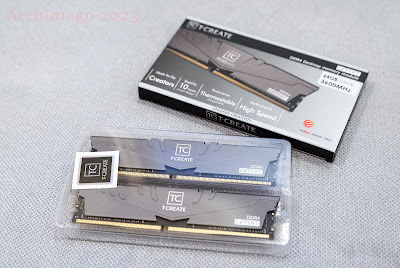
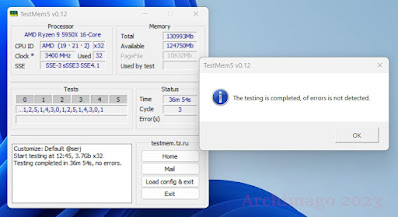

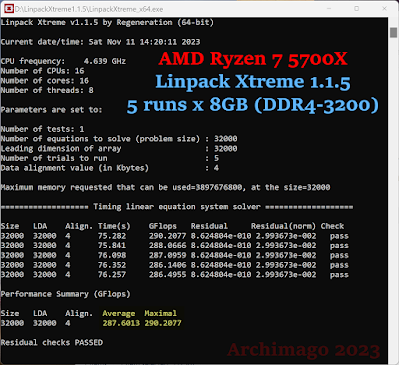
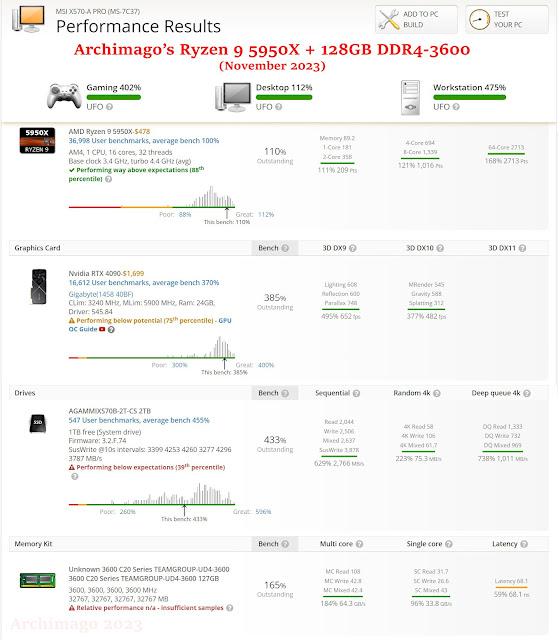
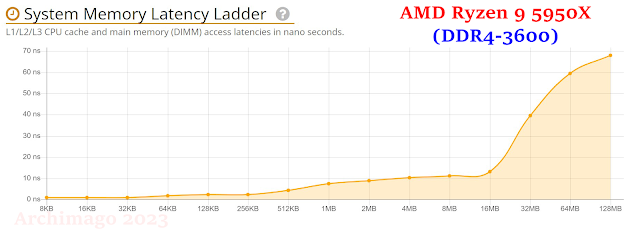






Hej Arch,
ReplyDeleteYou have written such an interesting and comprehensive article and yet no comments! There is so much there that excites me with links to so much more that I could easily spend a good part of the day going through it all. Not even a comment from the several Indian steel manufacturers that have become fans of your blog. I suppose computer stuff is not for all audiophiles or the Asian steel industry. My favorite moment of the day is listening to my desktop setup either on headphones or through speakers whilst catching up with the depressing news of the world. Or trying to be productive…
I suppose true audiophiles would consider this behavior unbecoming a serious listener. No distractions to interfere with the concentrated hearing of one’s chosen music. I, however, become far too easily restless if I only listen. I believe that am equally entertained by the music whilst doing something else on my computer. I am certainly in the sweet spot the entire time! I do of course have a serious system where I can comfortably enjoy my passion although I’ll probably be reading a book at the same time!
A decade ago, many in the tech industry proposed the idea that the PC as we know it would be extinct by 2020. Something even Steve Jobs touted when he unveiled the iPad in 2010. But this of course hasn’t happened. The remarkable innovations of the past decade have ensured that.
So, the PC is still thriving despite all of us carrying powerful devices in our pockets.
A remarkable comparison is the computing power in the Apollo 11 during the first Apollo Landing in 1969 and with what we carry in our pockets.” Apparently, the calculators released by Texas Instruments in 1998 and 2004, were respectively 140 and 350 times faster than the onboard computer on the Apollo 11. These were the T-73 and T-84 used by students everywhere to help pass their exams.
The latest phones typically have 4GB of RAM. That is 34,359,738,368 bits. This is more than one million (1,048,576 to be exact) times more memory than the Apollo computer had in RAM. The iPhone also has up to 512GB of ROM memory. That is 4,398,046,511,104 bits, which is seven million times more than that of the guidance computer.”
Source: https://psmag.com/social-justice/ground-control-to-major-tim-cook
Cheers Mike
Yo Mike,
DeleteLOL. Thank goodness the Indian steel industry took a break this week. Gets tiring going over that spam to delete (or report them to Google) :-).
Yeah, while the computer stuff could be off the beaten path for some audiophiles, I think as contemporary tech hobbyists of all variants, there's something to be said about being aware of the general computing systems and understanding the trends they're taking. Keeping up to date and knowing where we stand can go a long way towards not getting taken for a loop. Knowing the price of products and these days just how good this stuff is - power utilization getting better, acoustic noise going down, much less radiated RF compared to generations past!
I agree with you about the prototypical belief that when listening we should not be doing anything. Eyes closed, listening intently to the music, as if we need to be deep in meditation with the music or something. Nah. While I enjoy spending time in the sound room and find that I need to do that a few times every week, I spend much more time on my Workstation doing work, writing, E-mails, and being able to enjoy the small speakers or headphones counts just as much to my music enjoyment. Bluetooth headphones for chores like washing dishes or vacuuming or cleaning up papers is yet another significant chunk of enjoying what I'm doing.
The desktop computer is definitely not disappearing in the foreseeable future. The convenience of large screens, full-sized keyboards, a comfortable chair, nice desktop speakers for music and videos, and the power under the hood to get things done quickly ensures that this is the best computing experience for me at least.
Nice reminder of Apollo 11! And yet humanity has not set foot back on the Moon yet after all this time. Another fascinating comparison is with the Voyager 1 & 2 probes from 1977:
https://www.allaboutcircuits.com/news/voyager-mission-anniversary-computers-command-data-attitude-control/
70KB of programming. Written in Fortran. Magnetic tape system. Amazing stuff considering that they're still sending back data from deep space beyond the heliosphere (in interstellar space now), after more than 45 years! Now that's some amazing operational life and quality control! ;-)
Hej Arch.
DeleteYes! Because music is so important for my well-being I, like you, have it constantly with me in one form or another. This necessitates convenience. I am more likely to use my Bluetooth ear buds when doing chores round the house or when travelling, than connecting my iems to a portable dac/amp connected to my mobile. I can also receive notifications, answer calls and so on. Sonically perhaps not quite as good as the cumbersome alternative but far more practical. And of course, there are no annoying cables to deal with. The iem market and their aficionados, however, do not seem to agree with me. There has been a colossal rise in popularity with new products introduced on a seemingly daily basis. The appeal appears to be a combination of high fidelity, portability and attractiveness. Yet another rabbit hole to lose one’s mind and money in. A new generation seem to desire an ability to pursue their interests whilst mobile. Not tied down to one place to enjoy it. The focus seems to be on portability, versality and connectivity. Despite our shared hope for the future of the home pc, I can envisage a future where technology allows and encourages people to do what they want where they want.
Just me rambling again.
Cheers Mike
# Read the article you linked on the Voyager probes. Truly remarkable
Hey Mike,
DeleteMany "rabbit holes" out there! That's alright, whatever floats one's boat, eh?
No doubt there will be growth with mobile computing and work. And with it the desire - need even - to have high-quality music wherever we go. As time goes on, I trust we'll have even better wireless playback quality whether over Bluetooth or something with greater bandwidth like Ultra-Wide Band (UWB).
I think there will be interesting and fun developments ahead! There are all kinds of new products released, however I'm always on the look out for new technologies that can push fidelity forward (I don't think there's that much new out there pushing sound fidelity so it's quite manageable).
As audiophiles, I hope most of us will keep our minds open to the new technologies ahead whether it's wireless devices, multichannel, DSP, etc. so as to keep the hobby fresh, growing, and vibrant...
Archimago,
ReplyDeleteI really enjoy reading about your "detours" into computers etc! A great combination of thorough research and sensible opinions, as always.
Personally, I do have some mixed feelings here though. It's certainly good to see prices going down and performance going up. But at the same time I wonder how much of it is really "necessary" these days. My current (desktop) computer is almost five years old, but it still runs just fine for me.
Also, over the last few years, I have become a little more conscious about environmental aspects. I have bought a lot of devices that I hardly ever use, so that's an obvious waste of precious resources.
Hey there Freddie,
DeleteI hear ya. I agree that we have to be careful with all the waste we produce. At some point, we do need to think about there not being anywhere near the same rate of technological obsolescence as we've seen in the last 20-30 years.
I can imagine we're near the end of the cycle of year-to-year gains in profits in consumer electronics as this takes hold; perhaps we're there already or at least at the beginning phases...
Corporate interests might not like this kind of talk/thinking though!
Discover the perfect blend of style and functionality with Multiwood's thoughtfully designed office furniture collection.
ReplyDeleteFor More Details: https://multiwood.ae/